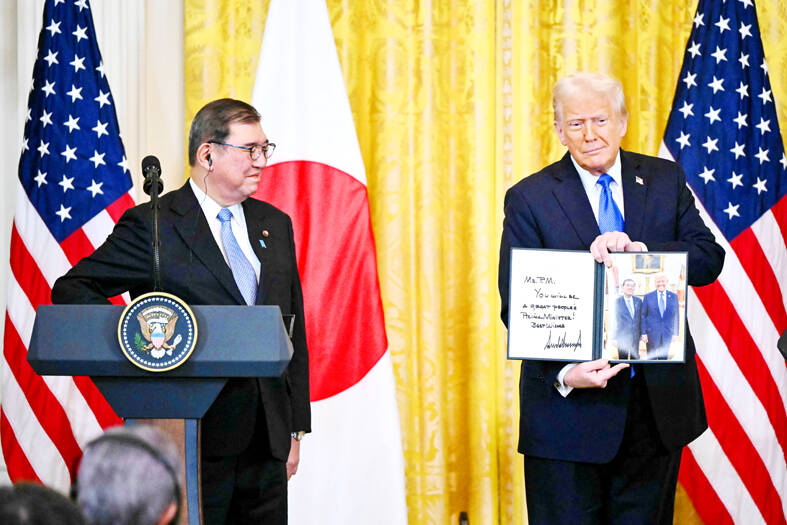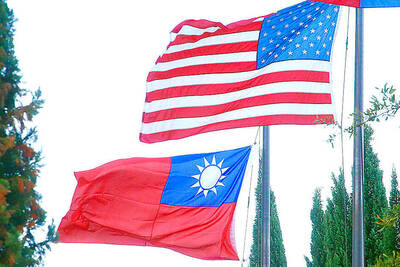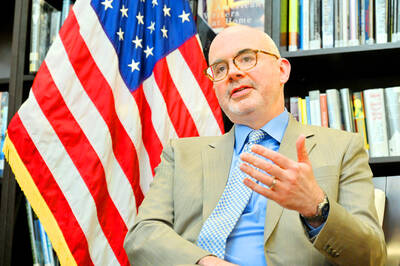Japanese Prime Minister Shigeru Ishiba and US President Donald Trump on Friday struck a warm tone at their first meeting, with Tokyo avoiding tariffs that Trump has slapped on other allies — for now.
However, Trump said he plans to announce reciprocal tariffs on many countries by tomorrow or Tuesday, a major escalation of his offensive to tear up and reshape global trade relationships in the US’ favor.
Heaping praise on each other at the White House, Trump and Ishiba pledged to stand together against Chinese “aggression” and said they found a solution for a blocked deal for troubled US Steel Corp.

Photo: AFP
Trump pressed Ishiba to cut the US trade deficit with Japan to zero, and warned that Tokyo could still face tariffs on exported goods if it fails to do so.
Ishiba, an avowed “geek” and model warship fan, has been under pressure to replicate Trump’s close relationship with former Japanese prime minister and golf buddy Shinzo Abe.
Both leaders insisted they had struck up a rapport during what was only the second visit by a foreign leader of Trump’s new term.
“I was so excited to see such a celebrity on television in person,” Ishiba told their joint news conference, while saying he was not trying to “suck up.”
“On television he is frightening and has a very strong personality, but when I met with him actually he was very sincere and very powerful,” he said.
As they exchanged photographs, Trump praised the 68-year-old Japanese prime minister as “good looking” — typically one of the former reality TV star’s highest orders of praise.
The US president laughed and said “that’s a very good answer” when Ishiba said he could not respond to a “theoretical question” about whether he would retaliate to any US tariffs.
Meanwhile, Trump said that Japan’s Nippon Steel Corp would make a major investment in US Steel, but not take over the troubled company as previously negotiated.
His predecessor, former US president Joe Biden, had blocked the deal.
The two leaders also doubled down on decades-old US ties in security and trade — despite fears that Trump could turn on Tokyo as he has with other US allies.
Trump said they had agreed to fight “Chinese economic aggression” and in a joint statement they condemned Beijing for “provocative activities” in the contested South China Sea.
They also called for a denuclearized North Korea, although Trump — who met North Korean leader Kim Jong-un during his first term — said he wanted to have “relations” with Pyongyang.
Behind Trump’s expressions of support were Japan’s promises of a US$1 trillion investment in the US and to boost Japanese purchases of US defense equipment.
Ishiba said his country was the biggest investor in the US and would step up its spending.
Additional reporting by Reuters

NATIONAL SECURITY: The Chinese influencer shared multiple videos on social media in which she claimed Taiwan is a part of China and supported its annexation Freedom of speech does not allow comments by Chinese residents in Taiwan that compromise national security or social stability, the nation’s top officials said yesterday, after the National Immigration Agency (NIA) revoked the residency permit of a Chinese influencer who published videos advocating China annexing Taiwan by force. Taiwan welcomes all foreigners to settle here and make families so long as they “love the land and people of Taiwan,” Premier Cho Jung-tai (卓榮泰) told lawmakers during a plenary session at the Legislative Yuan in Taipei. The public power of the government must be asserted when necessary and the Ministry of

Proposed amendments would forbid the use of all personal electronic devices during school hours in high schools and below, starting from the next school year in August, the Ministry of Education said on Monday. The Regulations on the Use of Mobile Devices at Educational Facilities up to High Schools (高級中等以下學校校園行動載具使用原則) state that mobile devices — defined as mobile phones, laptops, tablets, smartwatches or other wearables — should be turned off at school. The changes would stipulate that use of such devices during class is forbidden, and the devices should be handed to a teacher or the school for safekeeping. The amendments also say

EMBRACING TAIWAN: US lawmakers have introduced an act aiming to replace the use of ‘Chinese Taipei’ with ‘Taiwan’ across all Washington’s federal agencies A group of US House of Representatives lawmakers has introduced legislation to replace the term “Chinese Taipei” with “Taiwan” across all federal agencies. US Representative Byron Donalds announced the introduction of the “America supports Taiwan act,” which would mandate federal agencies adopt “Taiwan” in place of “Chinese Taipei,” a news release on his page on the US House of Representatives’ Web site said. US representatives Mike Collins, Barry Moore and Tom Tiffany are cosponsors of the legislation, US political newspaper The Hill reported yesterday. “The legislation is a push to normalize the position of Taiwan as an autonomous country, although the official US

CONSISTENT COMMITMENT: The American Institute in Taiwan director said that the US would expand investment and trade relationships to make both nations more prosperous The US would not abandon its commitment to Taiwan, and would make Taiwan safer, stronger and more prosperous, American Institute in Taiwan Director Raymond Greene said. “The US’ commitment to Taiwan has been consistent over many administrations and over many years, and we will not abandon our commitment to Taiwan, including our opposition to any attempt to use force or coercion to change Taiwan’s status,” he said in an exclusive interview with the Liberty Times (the sister newspaper of the Taipei Times) on Friday last week, which was published in the Chinese-language newspaper yesterday. The US would double down on its efforts